SEO for Startups: How to Get Organic Traffic on Your Website Fast
Contents
How To Drive Traffic To Your Website: 9 Proven SEO Tips
-
- Understand Your Target Audience
- Make Keyword Research a Priority
- Invest in Link-Building Activities
- Create Fresh, Value-Added, and Page-Turning Blogs
- Speed Up Your Website
- Make Sure Your Website Runs Seamlessly Across All Devices
- Build Your Website’s Domain Authority
- Improve Your Website’s Security and Encryption
- Supercharge Your Social Signals
Got It! Now How To See How Much Traffic A Website Gets?
Final Thoughts on How to Get Traffic to Your Website
Why More Website Traffic?
There are currently over 4.6 billion people online right now. In total, web users across the globe are running an astounding 3.8 million searches per minute.
It takes a couple of seconds to process those numbers and let the sheer power of the internet wash over you. It’s distinct, powerful, and impossible to ignore.
Website traffic is an important factor in driving your sales and ultimately defining your long term growth online.
Wondering how to get traffic on your website?How to increase existing traffic to your website?And how to grow your website organically?There’s always pay-per-click options if you can afford that. If not, there’s plenty you can do to increase organic traffic at a much lower cost. That’s what we want to focus on here, but first…
What Is Organic Traffic?
Unlike paid search results, organic search results are free, and dominate Google search engine result pages (SERPs).
Here’s a closer look:
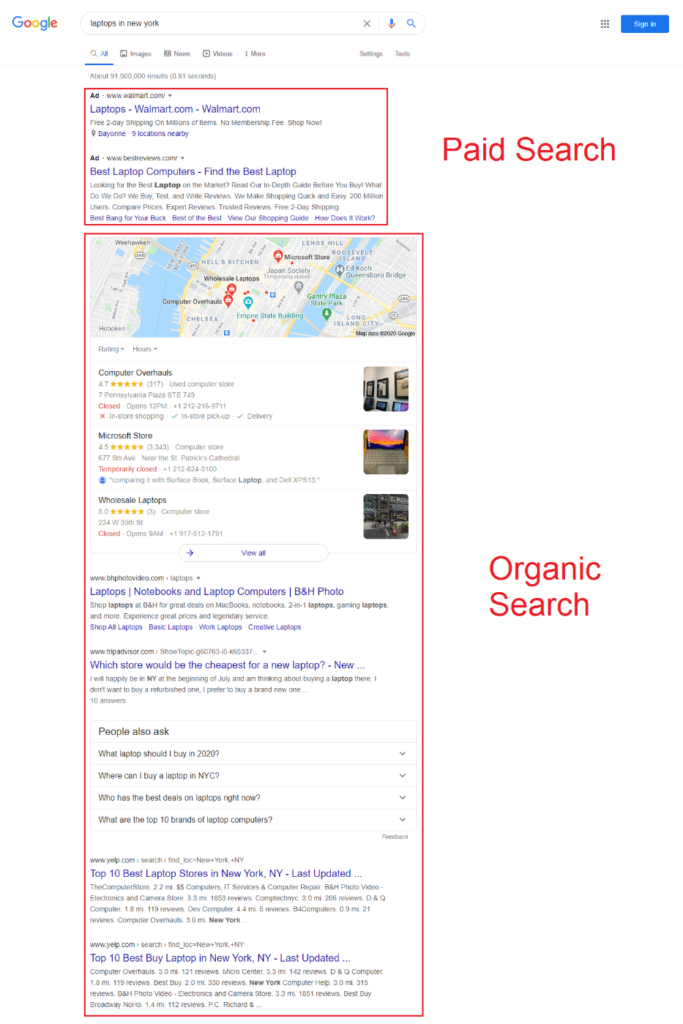
While paid search results are achieved through pay-per-click advertising, organic search results are, as the name suggests, completely organic.
In essence, it’s impossible for you to “buy” them.
Each time a web user runs a Google search, the Google algorithm gets to work instantly. It crawls, indexes, and ranks a wide, wide, wide range of websites based on multiple factors.
If your webpage shows up among the top search results, you’ve done your job and pleased the algorithm gods. And as the competition becomes fiercer every day, failing to impress the algorithm gods isn’t an option.
If your startup
doesn’t show up on the first page, you’ll struggle to get your business seen by prospective customers.
Over time, poor reach will translate to poor engagement, conversions, and profit. Trust us, you don’t want to go down that rabbit hole, especially as an up-and-coming business that’s still putting down roots.
“How do I get my company to come up on Google search?”
You leverage SEO for startups.
If you’re just getting started, here’s how to get traffic to your website fast.
How To Drive Traffic To Your Website: 9 Proven SEO Tips
1.Understand Your Target Audience
While focusing on Google algorithm should be one of your top priorities, it shouldn’t be the only one.
The novelty and rush of launching a startup can compel you to push the “optimization” button with full force. And there’s nothing wrong with that; in fact, it’s exactly what you should be doing. However, many startups tend to shift the focus from their target audience to Google’s algorithm. If you’re guilty of doing this, stop and re-strategize before the damage begins to manifest.
Take the time to understand your target audience before you start looking into how Google crawls, indexes, and ranks websites.
If you don’t have a foundational understanding of user intent and preferences, your SEO strategy will lack relevance and be all over the place.
Here’s how you can get started:
- Narrow down your demographic and dive deep into their search intent, interests, and preferences.
- Put yourself in their shoes:
What would you search for?
What kind of content would you be interested in?
What trends would you like to keep up with?
As you do this, make sure your products/services are at the center of your brainstorming process.
Let’s say you sell supplements for women in Los Angeles; you’re very likely to come up with the following search queries:





The better you understand your target audience, the more relevant your list of search queries will be.
Make sure you take relevant national holidays (International Women’s Day, in this case), trends, pop culture references, news, entertainment stories, etc. into account.
The goal is to determine what your audience wants instead of obliviously turning to SEO. Once you have a good grasp on how your potential customers think, you’ll excel at SEO.
2.Make Keyword Research a Priority
Keywords are to SEO what lemons are to lemonade: indispensable.
How do you grow your website organically? You need a stellar keyword research strategy in place.
Luckily, you’re halfway there.
Now that you understand your target audience to a tee, compile a list of relevant keywords, i.e. industry-specific search queries that lead customers to your business.
As a startup, you should focus on the following types of keywords:
- Short-tail keywords: Short keywords comprising three words or less (e.g. “salon in Manhattan”)
- Long-tail keywords: Long keywords comprising 3+ words (e.g. “best tech support in Michigan”)
- LSI (Latent Semantic Indexing) keywords: Keywords that are conceptually related to a topic (e.g. if you’re talking about interior design, LSI keywords may be décor, living room, wall colors, etc.)
It’s important to note that LSI keywords can be either short-tail or long-tail.
If your products/services are restricted in a specific area, make sure you use local phrases to target local customers. The last thing you want to do is target businesses in Florida when your IT support firm is based in Washington.
Using local keywords will help Google compartmentalize your business.
The outcome?
You’ll rank higher for relevant local searches and manage to eliminate uninterested buyers in regions where your products/service are unavailable.
If you’re creating your own list of keywords (more on this later), use Google Trends to gauge their popularity.
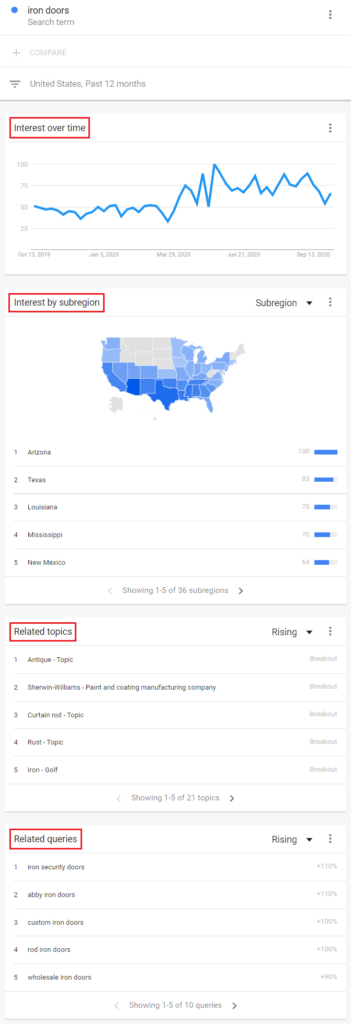
In addition to “interest over time,” you’ll also manage to get an overview of “interest by sub region,” “related topics,” and “related queries.”
We strongly recommend branching out into industry-relevant trends to ensure your keyword strategy isn’t run-of-the-mill.
If you’re looking to gain a competitive edge in your industry and increase traffic to your website, don’t take things into your own hands and call it a day. Instead, consult keyword research specialists to receive a list of customized keywords each month.
With extensive experience and expertise, they’re adept at narrowing down the top keywords for your industry. They use cutting-edge software to identify high-volume keywords that increase your chances of ranking higher on SERPs.
Ultimately, a professional keyword research strategy will play a big role in helping you increase website traffic through Google.
For more on Google’s ranking factors, read: 8 Crucial Google Ranking Factors You Shouldn’t Ignore in 2020
Ready to get more traffic on your website?
3. Invest in Link-Building Activities
According to recent data, the “link popularity” of a website makes up for 22.33% of Google’s ranking factor. This of course works if the linking websites are trustworthy and credible.
The more credible incoming links you have, the more “authoritative” your website becomes in the eyes of search engines.
To understand how link-building works, check out this video:
4. Create Fresh, Value-Added, and Page-Turning Blogs
Posting a blog to your website increases its chances of ranking in Google search results by 434%!
As a startup, you should have a strong focus on visibility.No matter how great your business model may be, if your web pages don’t show up on the first page of Google, you’re pretty much invisible in the digital world.
Creating a winning content marketing strategy is tantamount to placing a microphone to your mouth. It’ll amplify your brand and create lasting echoes that reach everyone—even the back benchers.
They don’t say “content is king” for nothing!
Start off with a small-scale content marketing strategy. While you may feel tempted to try your hand at different types of content, you’ll end up feeling overwhelmed as a new business.
There’s a lot that you need to focus on right now, including funding, infrastructure management, business insurance, etc. Marketing is part of it. Instead of putting all your eggs in one basket, adopt a smart approach and go slow.
Focus on blogs for now.
Create value-added, page-turning blogs that rank high on Google SERPs and get your business out there! As you rank among the top organic search results, you’ll get more traffic to your website and increase conversions.
As a startup, that’s exactly what you want.
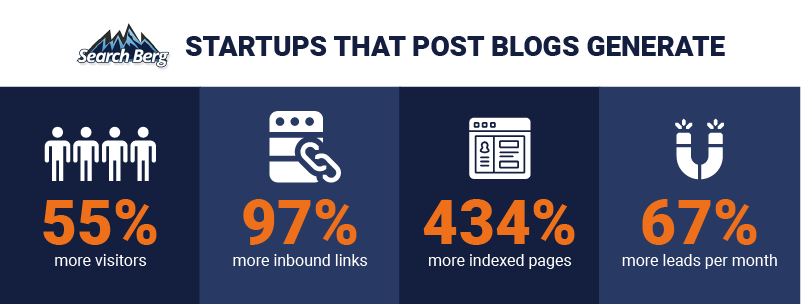
Turn to Google Trends to keep up with the whole gamut of industry relevant trends (holidays, events, news bits, etc.).
Occasionally create content around these trends to ensure relevance and keep your audience engaged in the long run.
This is a great way to avoid churning out the same ol’ blogs that lack value and ingenuity.
So how do you grow organic traffic? Think outside the box and let your creative juices run wild! Unique, imaginative, and original blogs is the answer!
Over time, you can begin to experiment with diverse types of content, including articles, press releases, guest posts, infographics, and videos, among others. But for now, stick to creating a winning blog marketing strategy.
Don’t have the time to write engaging blogs?
and sign up for our affordable custom blog services.
5. Speed Up Your Website
Remember the golden ranking factors we touched upon earlier?
Those that make it easier for Google’s algorithm to rank websites on SERPs?
Well, site speed is one of them.
Google uses page speed, among a wide range of other factors, to rank webpages.
Here’s an excerpt:

Source: Google
In short, if your website takes too long to load, you can wave high rankings goodbye.
If you’re looking to grow your website traffic, you need to make sure your webpages show up among the top organic search results on Google.
Start by using Google’s very own PageSpeed Insights to determine whether your website passes the Core Web Vitals assessment. You’ll get an overview of your site’s speed and general user-friendliness so you can work on the weaknesses accordingly.
Toggle between “mobile” mode and “desktop” mode to gauge how well your site performs across each platform.
Here’s a snippet of the performance and speed report for Apple’s desktop site:
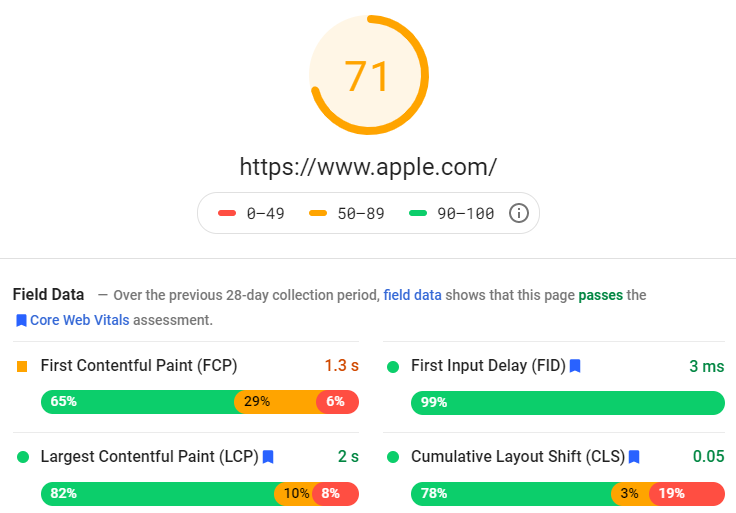
If you don’t pass the report, your website requires some work.
Focus on reducing page load speed by getting in touch with web development experts.
You can also try the following strategies to speed up your website:
- Enable compression
- Minimize HTTP requests
- Use a content delivery network (CDN)
- Optimize images for speed
- Use faster plugins
- Reduce server response time
6.Make Sure Your Website Runs Seamlessly Across All Devices

Web speed isn’t the only technical SEO factor that needs to be taken into consideration to maximize organic search traffic.
If your website doesn’t run seamlessly across all devices, you could be setting yourself up for failure. It’s virtually impossible that your target audience solely uses their desktop to search for products/services online.
Over the past few years, internet use has continued to diversify. Presently, people use a wide range of devices—including desktops, laptops, smartphones, tablets, etc.—to connect with brands online.
So if your website runs smoothly on certain devices but appears ghastly on others, you’ll struggle to boost conversions.
And that’s not all.
Google uses mobile-friendliness as a key ranking factor.This means startups that launch mobile-friendly websites rank higher than those that don’t.
Better rankings, greater traffic, excellent conversions, long-term growth… need we go on?
Increase organic search by making sure your website looks and operates optimally across all devices. It’s important to check both web design and development off the list. Skimping on either will take a toll on your rankings.
7.Build Your Website’s Domain Authority
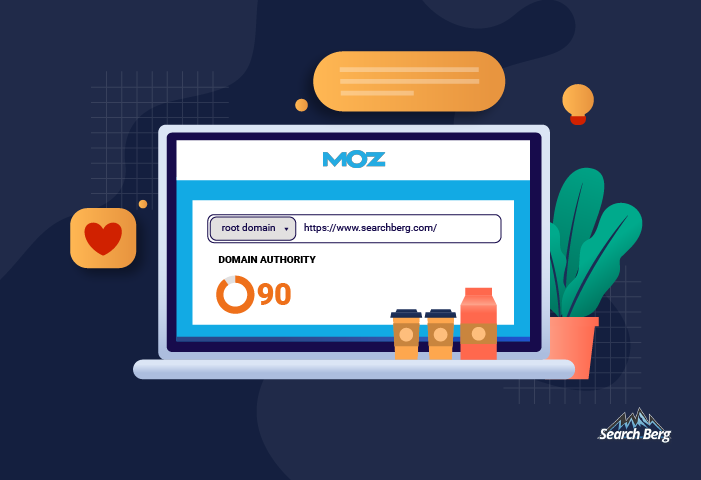
Created by Moz, Domain Authority (DA) is a measure of how well your website ranks on SERPs.
It takes multiple ranking factors into consideration to calculate your website’s authority.
The score ranges from 0–100, with 0 being and lowest and 100 being the highest. A DA between 40 and 50 is considered average while anything above60 is considered excellent.
To put things into perspective, here’s a glimpse into the DA of some of the top businesses across the globe:
- Apple: DA = 100
- Adobe: DA = 98
- TIME: DA = 94
- Entrepreneur: DA = 92
Needless to say, websites with a high DA get more traffic than those with an average or below-average DA.
Can SEO help your startup grow? Absolutely! As a startup, you should have a strong focus on building authority from the get-go.
- Start by optimizing on-page content, including your blogs, product/service pages, local pages, etc.
- Use title tags, Meta description tags, image alt text, canonical tags, and shorter URLs to improve your rankings.
- In addition, try your hand at link building to increase organic reach.
Link building is the process of acquiring high-quality hyperlinks (also known as “backlinks”) from websites with a high DA. As they link to your webpages in their content, you’ll generate more traffic and get your startup seen by a wide audience.
Recommended Read:10 Advanced Link Building Tips and Tricks to Boost Your SEO
8.Improve Your Website’s Security and Encryption
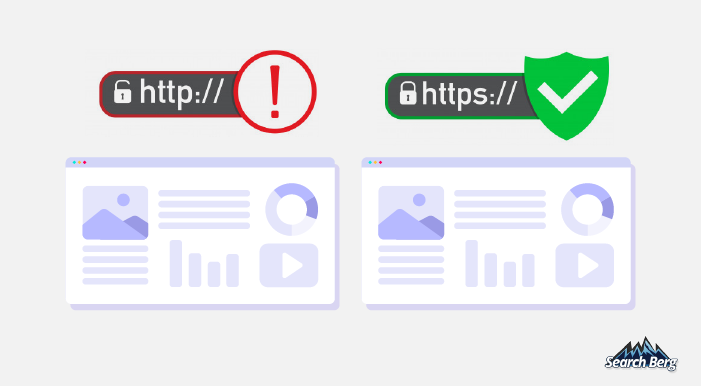
In 2014, Google announced that it would be using HTTPS as a ranking signal.
In essence, websites that are secured with HTTPS encryption are more likely to climb to the top rungs of Google SERPs than those that aren’t.
Here’s what you need to do:
- Start off by getting an SSL certificate to enable an encrypted connection. This will protect user data entered on your website.
- Make sure you partner with a reliable and trusted hosting company to ensure optimal security and reduce the risk of a security breach.
- Eliminate further security issues by using expertly developed plugins and themes.
Not only will these measures help you rank higher on SERPs, but they’ll also protect your startup in its initial stages of inception.
9.Supercharge Your Social Signals
Social signals are metrics that demonstrate the level of engagement and activity on your social media pages. They include, but are not limited to, likes, shares, views, pins, votes, tags, follows, tweets, retweets,etc.
Now, marketing experts have long debated whether social signals affect rankings and organic search or not. If you think about it, excellent social signals equate to a booming social media presence. And if you’ve made it big on social media, it goes without saying that your business has garnered a lot of followers and attention. This popularity in itself will hike up your webpages on SERPs.
But if we take this organic correlation out of the picture, does Google’s algorithm actually care about social signals when ranking webpages?
Well, it does.
Moz has conducted numerous studies (exhibit A and B) to prove that Google does, indeed, use social signals to rank webpages. The increase in inbound links and citations plays a big role in making a business more visible on the web, which, in turn, improves rankings.
Supercharge your social signals by creating social media pages if you haven’t already.
Start with Facebook, Twitter, and Instagram. Over time, you can branch out into Pinterest, LinkedIn, and YouTube, if necessary.
Once you’ve set up your pages, make sure you fill them out to a tee. Don’t skip any important detail and make sure your business information (especially NAP—name, address, and phone number) is consistent across the board.
Now comes the fun part.
Optimize your pages by posting actively and regularly.
Don’t post for the sake of posting. If you share unengaging and lackluster content, you’ll struggle to engage and retain customers. Instead, share compelling, value-added, and original posts to get people talking about your startup for all the right reasons.
We also suggest sharing your blogs (and other types of content, if you have any) to send some link juice their way.
Actively engage with your followers by responding to comments, messages, and tags.The more friendly, attentive, and empathetic you are, the better the chances of building a wide customer base.
As a startup, retention should be one of your main focus. If a strategy strikes a chord with your audience, zone in on it to ensure customer satisfaction.
As you generate more traffic, increase conversions, and ensure audience retention, your startup will enjoy booming success!
Grow your startup by building a wide audience!
Got It! Now How To See How Much Traffic A Website Gets?
There are a few ways; if you own a website, it’s fairly simple. You can install Google Analytics for free. Click on Overview to see pretty accurate results of your overall web traffic.
Now, if you don’t own the website; let’s say you’re trying to get to know your competition (great move!), then try out:
- SimilarWeb: You can check out stuff like the website’s total visits, pages per visit, average visit duration and bounce rate.
- Ahrefs: This one’s more accurate and extensive. You can review monthly total visits, top ranking keywords; you can even break down pages that receive the highest traffic. Pretty cool, right!
Final Thoughts on How to Get Traffic to Your Website
In this blog, we walked you through a step-by-step guide to growing your startup by leveraging SEO for small businesses.
We covered everything from understanding your target audience to using the right keywords for excellent local reach. We help you increase website traffic through search engines like Google and Bing.
If you’re ready to give SEO a go, we can help you kick things off.
At Search Berg, we offer expert small business SEO services to startups struggling to get seen online.
Our online marketing specialists analyze your business model, industry, and target audience to create a customized strategy that helps you hit the ground running! Call 855-444-4777 now or fill out the form below to start driving traffic to your website!












